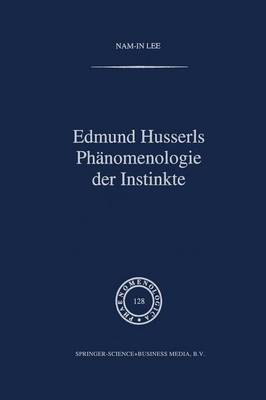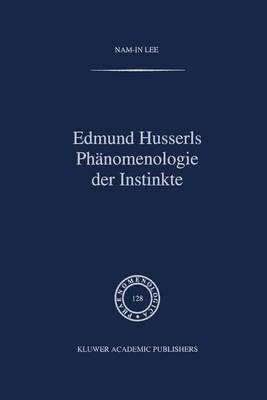Phaenomenologica
2 primary works
Book 128
Edmund Husserl published in his lifetime only works which represent a compilation of individual phenomenological analyses or which have the character of an introduction to his phenomenology. It always made him uneasy that he did not publish any systematic work in phenomenology. In his later years, from the beginning of the 1920s, he tried several times to write such a work, but in vain. The masterplan for this work, which his assistant Eugen Fink sketched out in 1930/31 is preserved. According to this plan, the Phanomenologie der Instinkte has attracted very little attention in Husserl studies until now, takes a central and fundamental position in the whole system of his mature transcendental phenomenology. In this book, Nam-In Lee reconstructs the Phanomenologie der Instinkte on the basis of the already published works and, above all, of the unpublished manuscripts of Husserl. Moreover, he draws out the consequences which the Phanomenologie der Instinkte bears for the whole system of phenomenology. Transcendental phenomenology, in its form of a genetic phenomenology of which the Phanomenologie der Instinkte is the concluding part, can, according to him, no longer be considered as one-sided philosophy of consciousness in the traditional sense, as it has often been thought of hitherto. Thus, the author presents a new face of phenomenology; one which has scarcely been noticed in the field of Husserl studies until now."
Book 128
Edmund Husserl published in his lifetime only works which represent a compilation of individual phenomenological analyses or which have the character of an introduction to his phenomenology. It always made him uneasy that he did not publish any systematic work in phenomenology. In his later years, from the beginning of the 1920s, he tried several times to write such a work, but in vain. The masterplan for this work, which his assistant Eugen Fink sketched out in 1930/31 is preserved. According to this plan, the Phanomenologie der Instinkte has attracted very little attention in Husserl studies until now, takes a central and fundamental position in the whole system of his mature transcendental phenomenology.
In this book, Nam-In Lee reconstructs the Phanomenologie der Instinkte on the basis of the already published works and, above all, of the unpublished manuscripts of Husserl. Moreover, he draws out the consequences which the Phanomenologie der Instinkte bears for the whole system of phenomenology. Transcendental phenomenology, in its form of a genetic phenomenology of which the Phanomenologie der Instinkte is the concluding part, can, according to him, no longer be considered as one-sided philosophy of consciousness in the traditional sense, as it has often been thought of hitherto. Thus, the author presents a new face of phenomenology; one which has scarcely been noticed in the field of Husserl studies until now.
In this book, Nam-In Lee reconstructs the Phanomenologie der Instinkte on the basis of the already published works and, above all, of the unpublished manuscripts of Husserl. Moreover, he draws out the consequences which the Phanomenologie der Instinkte bears for the whole system of phenomenology. Transcendental phenomenology, in its form of a genetic phenomenology of which the Phanomenologie der Instinkte is the concluding part, can, according to him, no longer be considered as one-sided philosophy of consciousness in the traditional sense, as it has often been thought of hitherto. Thus, the author presents a new face of phenomenology; one which has scarcely been noticed in the field of Husserl studies until now.

